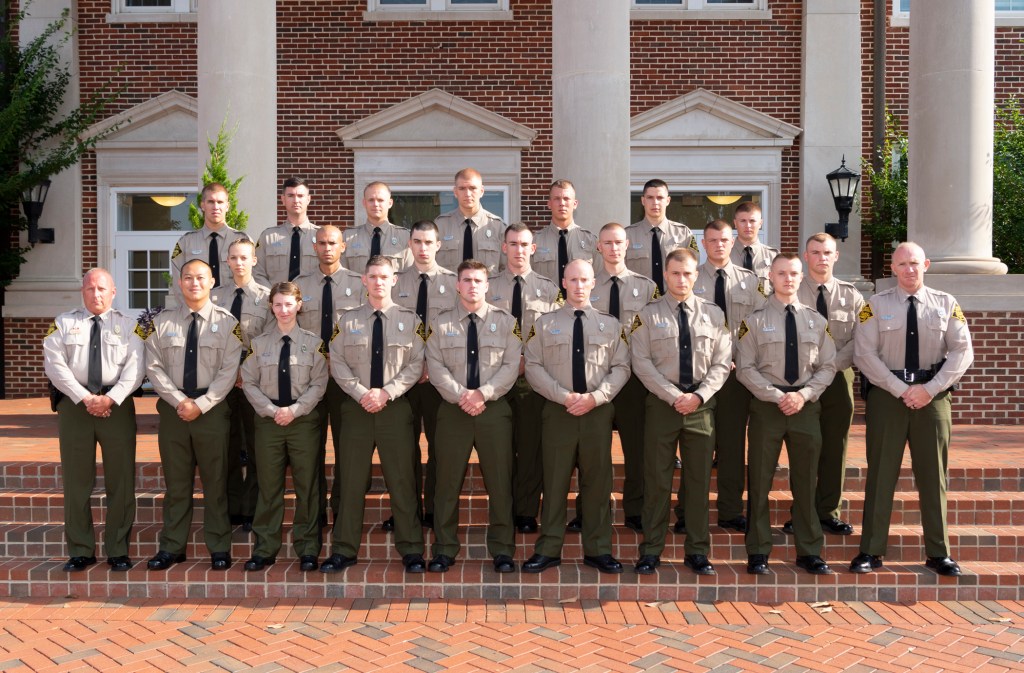21 Wildlife officers graduate Basic Wildlife Law Enforcement School
Published 12:44 pm Friday, June 29, 2018

- Photo by Missy McGaw The graduating class, from left, front row: Captain Mickey Little, Allen Y. Vang, Rose D. Williams, Nathaniel D. Rowlan, Jacob E. Long, Edward H. Perdue, Christopher L. Brittian, Alexander W. Holbrook, Lieutenant Ben Meyer Middle: Elisabeth R. Frasch, John C. Chavis, Aaron S. Cronk, Kyle T. Barkley, Cole F. Cantrell, Dakota L. Curtis, William K. Shepherd; back row: Hunter L. Everhart, William B. Boone, Jared C. Garland, Jeffrey H. Doran Jr., Jenrette A. Springs, John R.A. Dooley, Jonathan M. Hornbeck.
Twenty-one cadets were sworn in as wildlife law enforcement officers by the N.C. Wildlife Resources Commission at a graduation ceremony held at Campbell University on Thursday. During the ceremony, which celebrated the Commission’s 55th Basic School graduation, each cadet took an oath to enforce criminal laws, including conservation and boating laws, and to faithfully and impartially execute the duties of a law enforcement officer in North Carolina.
Each new wildlife officer will now begin six months of on-the-job training under the supervision of a veteran wildlife officer. Upon completion of field training, each officer will be assigned a permanent duty station.
The graduating officers are listed below, along with their county of assignment:
Trending
Kyle Barkley of Putnam, Tenn. (Chatham County)
William Boone of McDowell County (Cleveland County)
Christopher Brittian of Buncombe County (Jackson County)
Cole Cantrell of Caldwell County (Anson County)
John Chavis of Robeson County (Bladen County)
Aaron Cronk of Ashe County (Stokes County)
Dakota Curtis of Sumter, S.C. (Swain County)
John Dooley of Saranac Lake, N.Y. (Wilkes County)
Jeffrey Doran of Deep River, Conn. (Currituck County)
Hunter Everhart of Wake County (Martin County)
Elisabeth Frasch of Wake County (Chowan County)
Jared Garland of Yancey County (Rockingham County)
Alexander Holbrook of Pender County (New Hanover County)
Jonathan Hornbeck of Pitt County (Cumberland County)
Jacob Long of Columbus County (Franklin County)
Edward Perdue of Union County (Sampson County)
Nathaniel Rowlan of Loveland, Colo. (Lenoir County)
William Shepherd of Wilkes County (Iredell County)
Jenrette Springs of Guilford County (Wake County)
Allen Vang of Iredell County (Mecklenburg County)
Rose Williams of Horry, S.C. (Catawba County)
“Today’s graduation celebrates the accomplishment of these newly-sworn officers successfully completing 27 weeks of intensive training,” said Col. Jon Evans. “These new officers will now move into field training where they will apply the knowledge and skills they have spent the past six months learning. We look forward to them joining our ranks in the field and to the contributions they will make conserving our state’s wildlife resources, promoting safe, responsible boating and providing quality education throughout North Carolina.”
All wildlife law enforcement officer trainees are required to pass an extensive background, psychological and physical screening before entering an intensive accredited academy conducted by the Law Enforcement Division. The majority of the training is held at the N.C. Justice Academy in Salemburg. Officers complete conservation-specific training on fish and wildlife laws, motorboat accident investigation and protected species. Instruction covers statutory and investigation procedures, defensive tactics, fish and game laws, and pursuit driving and boating.
The Commission’s Law Enforcement Division is now accepting applications for Wildlife Law Enforcement Officers for the 56th N.C. Wildlife Resources Commission Basic School. Visit www.governmentjobs.com for more information.





